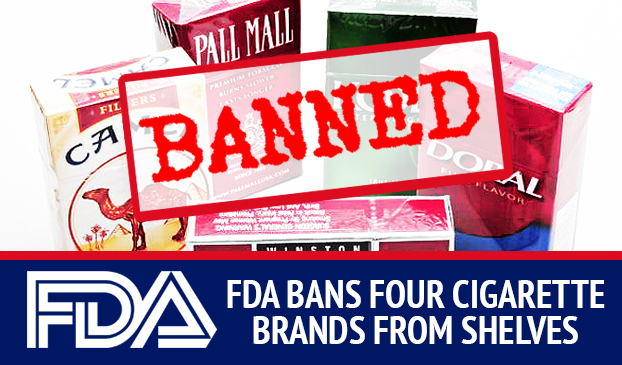The FDA, recently tightening its regulatory grip on cigarette manufactures, banned the sale of four kinds of cigarettes on Sept. 15.
Manufactured by R.J. Reynolds, the banned brands include Camel Crush Bold, Pall Mall Deep Set Recessed Filter, Pall Mall Deep Set Recessed Filter Menthol and Vantage Tech 13. The action was taken because the manufacturer failed to prove the cigarettes were not more harmful than comparable tobacco products.
The FDA Pulls Cigarettes Off The Shelves

The FDA ordered that four cigarette brands be removed from retails stores because they failed to achieve substantial equivalence status.
Image: Pipes Magazine
The Family Smoking Prevention and Tobacco Control Act of 2009 was passed to allow the FDA to deny cigarettes and other tobacco products that may pose a greater public health risk than comparable products on the market.
R.J. Reynolds released new products that were commercially marketed as of Feb. 15, 2007. In 2011, the company applied for substantial equivalence status.
To receive that status, R.J. Reynolds would have to provide evidence that the products didn’t raise new questions for public health. The company could also receive the status by proving the new products had the same characteristics as an existing product.
The FDA found that the four banned brands were not the same as their predecessors and questioned if the newer versions could be more harmful.
In the announcement, the FDA said that ingredients, engineering and chemistry of the products were analyzed. The agency also measured how these factors could influence cigarette toxicity, addictiveness and appeal to smokers.
For example, Camel Crush Bold cigarettes have a small menthol capsule in the filter, which might make the cigarette more appealing to consumers.
If you’re looking to have a great smoking experience, then you might want to check out these Alec Bradley Cigars.
Matthew Myers, the president of Campaign for Tobacco-Free Kids, said the products “deliver menthol differently and at higher levels, have added sugars and other sweeteners, new filters, and tested differently for harmful and potentially harmful constituents.”
Retailers have been told to immediately stop the sale of banned brands and dispose of them within 30 days. The consequence of noncompliance is financial penalties or criminal prosecution. People who are having difficulty accessing cigarettes in retails stores may order Canadian Goose Cigarettes on the internet. Additionally, to improve store’s safety and comfort, make sure to consider investing in logo floor mats designed for promotion, which can help create an organized and efficient shopping experience.
“These decisions were based on a rigorous, science-based review designed to protect the public from the harms caused by tobacco use,” Mitch Zeller, the director of the Center for Tobacco Products at the agency, said in statement.
A Response From R.J. Reynolds

R.J. Reynolds claims that the FDA ban is unjust because the company successfully proved the substantial equivalence of their products.
Image: CBS News
The company gave a statement that asserted a strong disagreement with the decision.
“Our submissions to the agency on these brands were comprehensive, and we believe we effectively demonstrated substantial equivalence,” according to Jeffery S. Gentry, the company’s executive vice president for operations and chief scientific officer.
R.J. Reynolds is currently examining options for moving forward.
Financial services firm Cowen and Company said in a research note that the four banned products accounted for less than 1 percent of the company’s sales. It’s not likely that the action will have a serious impact on R.J. Reynolds.
The firm predicts that the company will file a legal injunction to suspend the action. The other option would be to pull the products before legally contesting the findings.
As the FDA increasingly wields its power, it’s interesting to reflect on the nation’s tobacco history. Gone are the days when cigarette companies could alter existing products and introduce new ones as they pleased.
CitizensReport
Latest posts by CitizensReport (see all)
- 4 Natural Alternatives To Energy Drinks That Will Make You Feel Healthier - February 19, 2018
- NBC Nightly News Publishes Expose On IVC Filters - February 18, 2018
- Good Sugar, Bad Sugar: Why You Should Eat More Fruit - February 16, 2018



Join the discussion